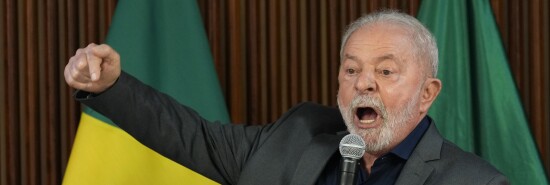
Brazil’s Lula is damaging democracy and allying himself with foreign autocrats
Tom Rogan
Video Embed
Brazil’s former president Jair Bolsonaro ended up being a clownish autocrat. Still, he generally supported the United States in international affairs. The same definitely cannot be said of Brazil’s current returner president, Luiz Inacio “Lula” da Silva. Indeed, the only apt comparison between Bolsonaro and Lula is that both men have little regard for democratic norms.
Lula’s invigorated penchant for domestic authoritarianism and his affection for foreign despots tends to meet Western media disinterest. But the facts are clear. Take Lula’s present push for very thinly veiled censorship laws. He claims these are necessary to fight “disinformation”; the legislative language seems designed as a catchall for Lula’s allies to pick and punish whoever speaks or publishes material in a manner they dislike. Lula is simultaneously consolidating power around a crony circle of party elites and rewarding prior allies, including highly corrupt allies, with lucrative jobs.
DEBT LIMIT DEAL: WHERE IT STANDS AND WHAT IS STILL TO COME
This effort finds sustaining allies in Western media. Celebrating Lula’s win, the Guardian offered a soaring salute to Lula’s “defense of democracy” after years in which “Brazil lost its way — and its mind” under Bolsonaro. Shortly before Lula’s victory, a Washington Post op-ed argued that Brazil needed “more targeted regulation and requirements that tech companies scrub their platforms.” An April Politico magazine story similarly declared that Lula’s disinformation strategy is not authoritarian in nature but rather designed to serve “voters crushed by economic inequality and confused by a torrent of social-media disinformation.” That Politico story also described Lula’s previous dead-to-rights corruption conviction as “questionable.”
Yet, whatever the judgment on its other works, there’s no doubt that Lula’s 2003-2010 presidency defined itself by endemic corruption. Manifested by undeclared penthouses and other monetary receipts, Lula’s corruption was extraordinary. As shown by Lula’s successor president and former chief of staff, Dilma Rousseff, the corruption of the Brazilian executive metastasized without limit.
Lula has now made Rousseff the head of a major development bank.
This is not to defend Bolsonaro. Having lost his reelection effort in the late October second round of voting, Bolsonaro then sat silent as thousands of his supporters spread chaos across Brazil. He stayed silent even as protesters launched repeated attacks on the capital, police, and Brazil’s democratic institutions. Bolsonaro, then, deserves no sympathy. Still, it is incomprehensible that Brazil’s president remains regarded by many in U.S. media and politics as some kind of positive partner. When it comes to every major foreign policy issue, climate change aside, the opposite is true.
On Ukraine, Bolsonaro has declared that Volodymyr Zelensky is “as responsible” for the war as Russia’s Vladimir Putin. To accept this argument necessarily requires one to accept Putin’s long-stated argument that Ukraine exists only as an extension of greater Russia. Put simply, to accept naked imperialism. Lula has also claimed that the U.S. “needs to stop encouraging war and start talking about peace.” This is music to Moscow’s ears, positioning a major democracy in de facto opposition to Ukraine’s democratic sovereignty.
On Beijing, Lula used an April visit to China to associate himself with just about every Chinese Communist Party foreign policy talking point. Saluting China’s tech industry and decrying the dollar, Lula called for Brazil and China to work on “building a new geopolitics so that we can change world governance by giving more representation to the United Nations.” This red-rosy rhetoric plays perfectly to Beijing’s vacuous narrative that it seeks a multipolar world of “win-win cooperation.” As attested by its policies toward Taiwan, Japan, South China Sea nations, and the U.S., China does not seek a multipolar world but rather a world in which the U.S.-led democratic order is replaced with a Beijing-led feudal autocratic order. Lula, the supposed democrat, has made clear he’ll be a happy partner to that effort.
Yet Lula’s democratic deficiencies are perhaps best measured by his disinterest in democracy in his own neighborhood. Once and always a friend of Cuba, Lula has wasted no time since entering office to forge closer links with other Latin American autocrats. Lula greeted Venezuela’s Nicolas Maduro as a hero as he visited Brazil on Monday. Lashing out at the U.S. “constructed narrative” that Maduro is an authoritarian, he called for sanctions relief on Venezuela and full cooperation between the two nations. Lula has similarly ignored major human rights abuses and anti-democratic activity by Daniel Ortega’s Nicaraguan government.
Lula may be many things, but a friend of democracy and America he is not. Let’s stop pretending otherwise.
